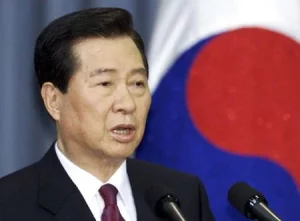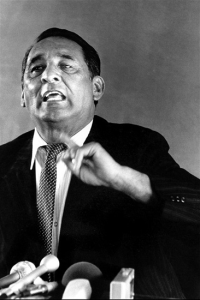Kim Dae-Jung, Jose Napoleon Duarte, & Donald Trump.
What do these three men have in common?
Other than the fact that they once led their nations, all three were prosecuted and convicted during show trials of bogus crimes by the reigning governments of their respective nations.
Two were sentenced to death—Kim Dae-jung of South Korea and José Napoleón Duarte of El Salvador. One, Donald Trump faces up to 20 years in prison if leftist Judge Juan Merchan throws the book at him during sentencing on July 11.
I met and interviewed two of the three men multiple times—Kim and Duarte. I have never met or interviewed Trump.
Perhaps a little background on Kim and Duarte might be helpful now. Some of you may never have heard of either man.
South Korean opposition politician Kim Dae-Jung was sentenced to death in September 1980 after he was convicted on manufactured evidence of sedition and conspiracy for allegedly instigating a popular uprising in South Korea’s southern city of Gwangju.
(Sound familiar? Does the protest rally at the U. S. Capitol Building on January 6, 2021, ring a bell?)
The incoming Reagan administration appealed to South Korean President Chun Doo-hwan to commute Kim’s death sentence. General Chun, who took dictatorial power in a military Coup d’état on December 12, 1979, viewed Kim as his number-one political rival.

Because of pressure from Washington, Kim’s death sentence was commuted to 20 years in prison. In 1982, he was released from prison and allowed to go into exile in the U.S. He settled in Boston, where he taught at Harvard University’s Center for International Affairs as a visiting professor.
Kim returned to South Korea in 1985. I, along with several other correspondents, was with him to ensure that he wasn’t assassinated as soon as he stepped off the plane. He was quickly placed under house arrest. Kim was eventually elected South Korea’s president in 1998 and served until 2003. He was awarded the Nobel Peace Prize in 2000. He died in 2009.
José Napoleón Duarte was slapped with his death sentence in 1972. He was accused of trying to overthrow the government following his disputed loss for president to an army-backed colonel named Arturo Armando Molina. Duarte was leading when the government ordered a halt to TV and radio broadcasts of the ballot counting. The following morning the authorities announced a victory of Molina.
Duarte protested the fraudulent loss and was subsequently arrested when several military officers who supported him were involved in an attempted coup d’état. Duarte, who was not a party to the attempted coup, was tortured and condemned to death for high treason.
Pressure from Washington and several international organizations forced Molina to allow Duarte to go into exile in Venezuela. He remained there until 1980, when he returned to El Salvador as the head of a new four-person revolutionary junta. Duarte eventually served as the elected president of El Salvador from 1984-89. He died in 1990.

The third man in this troika of political enemies is, of course, Donald Trump. While he has not been sentenced to death—at least not yet—he is possibly facing jail time if Judge Merchan decides to go that route during sentencing next month.
Trump was found guilty on each of 34 counts of falsifying business records in the first degree, a class E felony that carries a maximum sentence of up to four years in prison for each count. Merchan could decide to impose the sentences consecutively or simultaneously. However, under New York law, Trump could get a maximum of 20 years in prison.
I doubt that the specious guilty verdict against Trump will result in “hard time”—unless Merchan imposes house arrest. Most legal experts say that for a first-time convicted felon of advanced age (77), convicted of a low-level, nonviolent felony, there should be a relatively small chance of incarceration.

Here’s the point, however. Trump, like Kim and Duarte, should never have been charged or convicted in the first place.
When I covered South Korea and El Salvador in the 1970s and 1980s for the Chicago Tribune, I pitied the citizens of both those nations. They lived in countries where the ruling governments effectively disposed of their political opponents through assassination or imprisonment rather than at the ballot box.
I was thankful that the sitting president and government of the United States didn’t persecute or prosecute members of the opposition the way South Korea, El Salvador, or any number of other totalitarian governments in the world did.
Instead, in America, we let voters make those decisions.
At least we used to.

The Biden administration has changed the rules and set new precedents for dealing with those who oppose a sitting president and his minions.
Don’t like your chief political opponent? Does he get under your skin? Do you wish you could banish him?
Well, what are you waiting for? Go ahead, indict him, and have him arrested. Charge him with some contrived crime, install a “dependable” judge to reign over the trial, and ensure that you acquire manipulable and politically obedient leftist jurors who will return the “correct” verdict.
That’s how it’s done in nations that at least attempt to demonstrate a particle of rectitude and dedication to the traditional doctrines of a democratic republic.
Nations like the United States of America, where several hundred people who were at or near the U.S. Capitol Building on January 6, 2021, are languishing in federal prisons—some without benefit of the due process clause of the 14th Amendment.

Now that Democrats have successfully weaponized America’s system of justice and unleashed lawfare against those they oppose, we are becoming a banana republic that is careening toward a profoundly slippery slope littered with banana peels.
For almost 250 years the United States has managed to maintain a mostly fair and just system of laws and regulations. Sure, there were anomalies when the potent power of the government was iniquitously loosed against trusting citizens such as black Americans, Jews, Asians, Native Americans, and other minorities.
No system of jurisprudence is perfect. Flaws and warts abound, but for the most part, we kept those in check.
Until now.
For the first time in American history, a sitting president has approved and presided over the prosecution and conviction of his chief political rival—a man who faces the possibility of running his presidential campaign from behind bars.
This is uncharted territory for America. Well, up to a point, it is.
Donald Trump wouldn’t be the first candidate to run for president while imprisoned. That dubious honor belongs to Eugene V. Debs, who ran on the Socialist Party ticket in 1920 — and garnered almost a million votes.

Debs, born in 1855, became a fierce supporter of organized labor and a founding member of the Socialist Party of America. He ran for president as a socialist in 1900, 1904, 1908, and 1912.
In 1918, he was convicted and sentenced to 10 years in Federal prison for speaking out against America’s involvement in World War I—a violation of a recently passed Sedition Act. But being locked up in a federal prison in Atlanta didn’t end Debs’ political career.
In 1920, Debs was again nominated as the party’s presidential candidate while serving his prison sentence. Being behind bars didn’t make campaigning impossible, either. While Debs could not travel around the country, his party turned his imprisonment into a rallying cause. They put his convict number on campaign buttons, and surrogates spoke for him at campaign rallies. A film clip of Debs being informed of his nomination played in nationwide theaters.
So, there is hope. Even if Trump is caged, he can still roar mightily via social media. Pundits and polls assert that despite his conviction, Trump has more than an even chance of winning the November election.
I have three questions in case that happens:
(1) Will Trump be allowed to leave his cell to be inaugurated?
(2) Where will the nuclear football reside once he’s inaugurated?
(3) Where will an imprisoned U.S. President engage with and entertain foreign heads of state and other luminaries? In his prison cell? Wearing an orange jumpsuit?
Raise your hands if you think THAT will result in a chic photo op and strengthen admiration for America and its once-esteemed “democratic” institutions.
Yeah, me neither.
–30—
If you enjoyed this post, please consider subscribing to ForeignCorrespondent and tell your friends to subscribe. IT’S FREE! WHAT A DEAL! If you’ve received this from a friend and would like to be added to our distribution list for future blog posts, please enter your email address in the sign-up in the notifications box at:
https://ronaldyatesbooks.com/category/foreign-correspondent.
You can also find my commentaries on Substack at https://ronyates.substack.com/ and the American Free News Network at https://afnn.us.
Please feel free to comment. WE LOVE COMMENTS!


Biden reminds me of some of Tim Conways characters in skits: feeble minded, incoherent, and physically incapacitated.
At least Tim Conway’s Mr. Tuddball, the Swedish entrepreneur, ran a company and had employees. Biden has never done anything but gorge himself at the public trough.